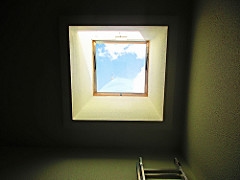A skylight lets you soak up even more of the bright, warm sunshine, but if not cared for correctly, skylights can ultimately leave you less comfortable.
The Trouble with Skylights
In summer, around 30 percent of your home's heat gain comes through your windows. In winter, your windows account for some 10andndash;15 percent of your heat loss. Skylights cause even greater heat gain because they receive more direct sunlight than windows.
In winter, your warm indoor air rises toward your skylights, which causes them to lose around 40 percent more energy than windows. Because your skylights aren't in direct view, you might not spot deterioration in the caulk and weatherstripping. Deterioration in these weatherization materials allows for air leaks that let your conditioned air escape, and let in humidity and air pollutants.
Keeping Your Skylights Efficient
Twice a year, thoroughly clean your skylights, including the inside and outside of the glass and the frame. Cleaning before winter ensures as much light and warmth as possible enter your home when you need it most.
While you're cleaning, inspect the caulk and weatherstripping, and replace it if you find deterioration. Schedule regular professional inspections for your skylights to stay ahead of developing problems. Install blinds to gain control over how much heat each skylight lets in. Venetian and other blinds can cut heat gain by nearly 40 percent and blackout blinds can reduce it even further.
As an added benefit, blinds provide insulation during the winter, reducing your heat loss. If heat and glare are a problem most of the day during summer, consider an exterior skylight cover. These block heat more effectively than blinds. Fixed and retractable covers are available.
If you're planning to replace the glass, look for glass with a SHGC (Solar Heat Gain Coefficient) close to 0.2. In addition, glass or plastic designed to block UV radiation helps protect your skin and prevent furniture fading.
Visit our website for in-depth information on most HVAC topics, or just give us a call at Valley Heating at (408) 868-5500.

